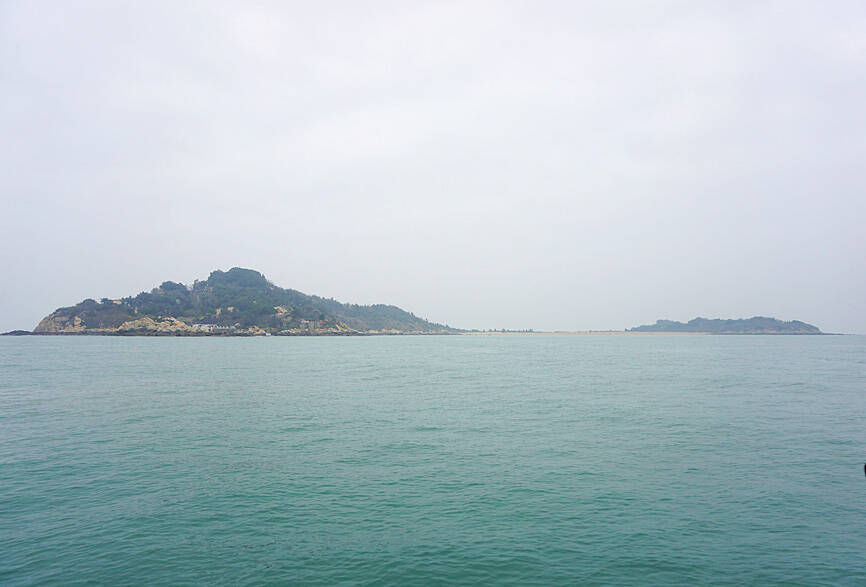The Ministry of National Defense is to be applauded after personnel at its Kinmen Defense Command fired shots to chase away Chinese commercial drones, Democratic Progressive Party (DPP) lawmakers said yesterday, adding that the ministry must establish standard operation procedures for such events.
Previously, troops had only fired warning flares in response to such incursions and refrained from more aggressive countermeasures, such as shooting the drones down, to avoid further escalating cross-strait tensions.
The Kinmen command said in a statement on Tuesday evening that soldiers stationed on three islets — Dadan (大膽), Erdan (二膽) and Shiyu (獅嶼) — each detected a Chinese commercial drone flying in restricted areas near their respective outposts at about 4:23pm.

Photo: CNA
In accordance with its four-step rules of engagement for drone encounters — “firing warning flares, reporting the incursion, expelling the drone and ultimately shooting it down” — the command said that soldiers first fired warning flares near the drones.
As the drones continued to hover, shots with live ammunition were fired to expel them, the command said, adding that they flew toward Xiamen on the Chinese coast about 5km away.
A similar incident occurred at about 5:59pm on Erdan Islet, the command said, adding that a single drone flew back to Xiamen a minute after troops fired shots at it.
The command provided no details on how many shots were fired or the kind of weapons used.
The information on Taiwanese troops firing shots at Chinese drones was released hours after President Tsai Ing-wen (蔡英文) early on Tuesday said that she had instructed the armed forces to take “strong countermeasures” when necessary to protect Taiwan’s airspace.
Taiwan’s military has come under heavy criticism for its apparent lack of a serious response to Chinese drone incursions in the airspace of Taiwan’s outlying islands.
Videos have been posted online of military facilities in Kinmen County that were apparently recorded by commercial drones.
DPP Legislator Hsu Chih-chieh (許智傑) yesterday said that incursions into Taiwan’s airspace by Chinese drones cannot be tolerated and thanked the ministry.
Taiwan’s military should respond appropriately, guided by the principle of self-defense, Hsu said.
The ministry should establish a response procedure for soldiers in such situations, he said.
DPP Legislator Chen Ting-fei (陳亭妃) said that a response procedure would allow the defense forces in Kinmen to call in equipment that could hamper or drive off drones instead of just broadcasting warning messages.
“The ministry should adopt a tougher stance on handling Chinese drone incursions,” Chen said.
Chinese Nationalist Party (KMT) Legislator Johnny Chiang (江啟臣) said that it was past due for the military to provide a “suitable reaction.”
The Vital Area Regulations (要塞堡壘地帶法) restrict access to military-controlled zones and their air space are no-fly zones, Chiang said.
Any aerial vehicle from any nation should be shot at or shot down if they ignore warnings, he said.

AGING: As of last month, people aged 65 or older accounted for 20.06 percent of the total population and the number of couples who got married fell by 18,685 from 2024 Taiwan has surpassed South Korea as the country least willing to have children, with an annual crude birthrate of 4.62 per 1,000 people, Ministry of the Interior data showed yesterday. The nation was previously ranked the second-lowest country in terms of total fertility rate, or the average number of children a woman has in her lifetime. However, South Korea’s fertility rate began to recover from 2023, with total fertility rate rising from 0.72 and estimated to reach 0.82 to 0.85 by last year, and the crude birthrate projected at 6.7 per 1,000 people. Japan’s crude birthrate was projected to fall below six,

US President Donald Trump in an interview with the New York Times published on Thursday said that “it’s up to” Chinese President Xi Jinping (習近平) what China does on Taiwan, but that he would be “very unhappy” with a change in the “status quo.” “He [Xi] considers it to be a part of China, and that’s up to him what he’s going to be doing, but I’ve expressed to him that I would be very unhappy if he did that, and I don’t think he’ll do that. I hope he doesn’t do that,” Trump said. Trump made the comments in the context

SELF-DEFENSE: Tokyo has accelerated its spending goal and its defense minister said the nation needs to discuss whether it should develop nuclear-powered submarines China is ramping up objections to what it sees as Japan’s desire to acquire nuclear weapons, despite Tokyo’s longstanding renunciation of such arms, deepening another fissure in the two neighbors’ increasingly tense ties. In what appears to be a concerted effort, China’s foreign and defense ministries issued statements on Thursday condemning alleged remilitarism efforts by Tokyo. The remarks came as two of the country’s top think tanks jointly issued a 29-page report framing actions by “right-wing forces” in Japan as posing a “serious threat” to world peace. While that report did not define “right-wing forces,” the Chinese Ministry of Foreign Affairs was

PREPAREDNESS: Given the difficulty of importing ammunition during wartime, the Ministry of National Defense said it would prioritize ‘coproduction’ partnerships A newly formed unit of the Marine Corps tasked with land-based security operations has recently replaced its aging, domestically produced rifles with more advanced, US-made M4A1 rifles, a source said yesterday. The unnamed source familiar with the matter said the First Security Battalion of the Marine Corps’ Air Defense and Base Guard Group has replaced its older T65K2 rifles, which have been in service since the late 1980s, with the newly received M4A1s. The source did not say exactly when the upgrade took place or how many M4A1s were issued to the battalion. The confirmation came after Chinese-language media reported